Unit 1 Relationships Lesson 1 Grammar课件(共29张PPT) 北师大版(2019)选择性第一册
文档属性
| 名称 | Unit 1 Relationships Lesson 1 Grammar课件(共29张PPT) 北师大版(2019)选择性第一册 | 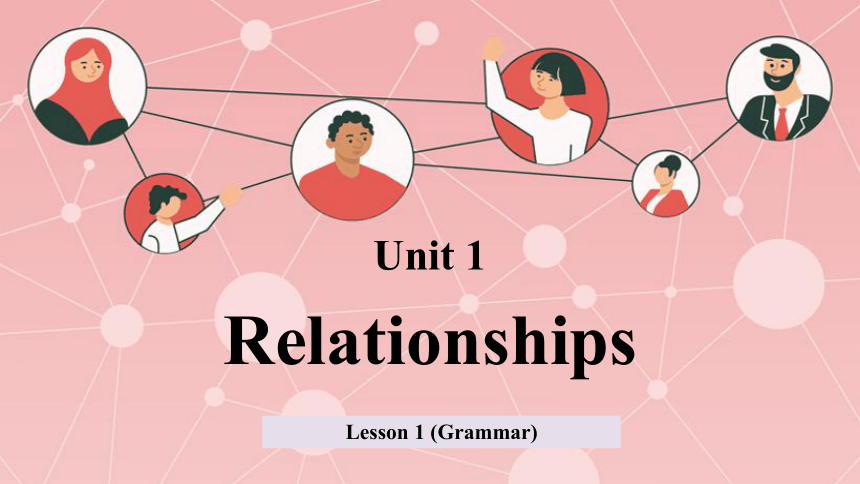 | |
| 格式 | pptx | ||
| 文件大小 | 21.0MB | ||
| 资源类型 | 教案 | ||
| 版本资源 | 北师大版(2019) | ||
| 科目 | 英语 | ||
| 更新时间 | 2025-07-28 17:22:19 | ||
图片预览

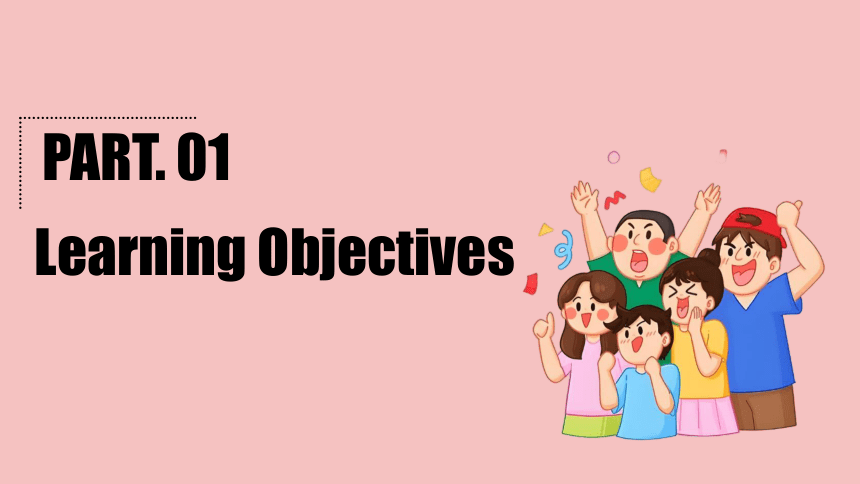
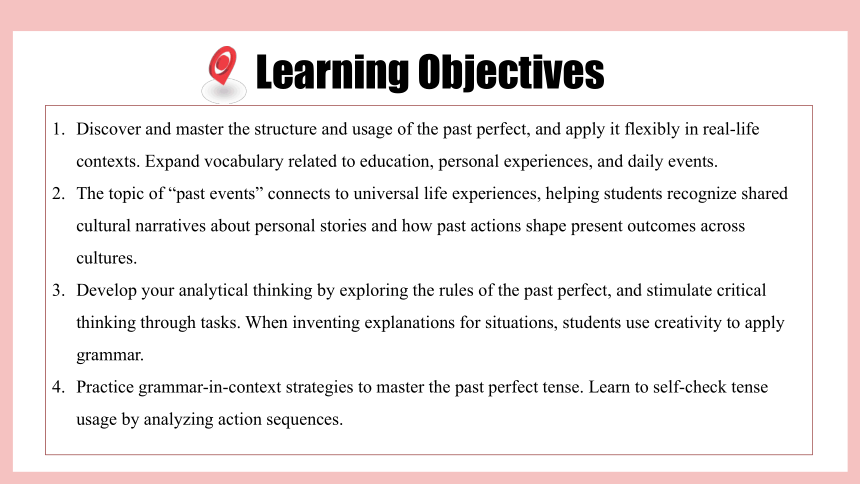

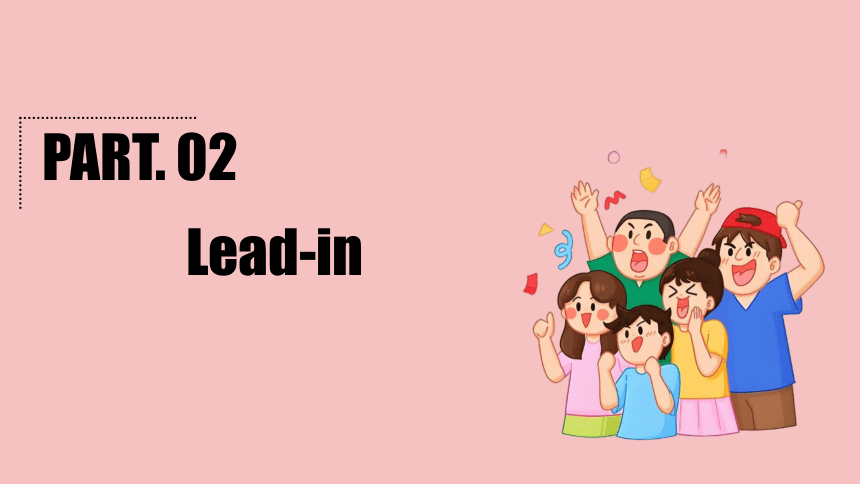
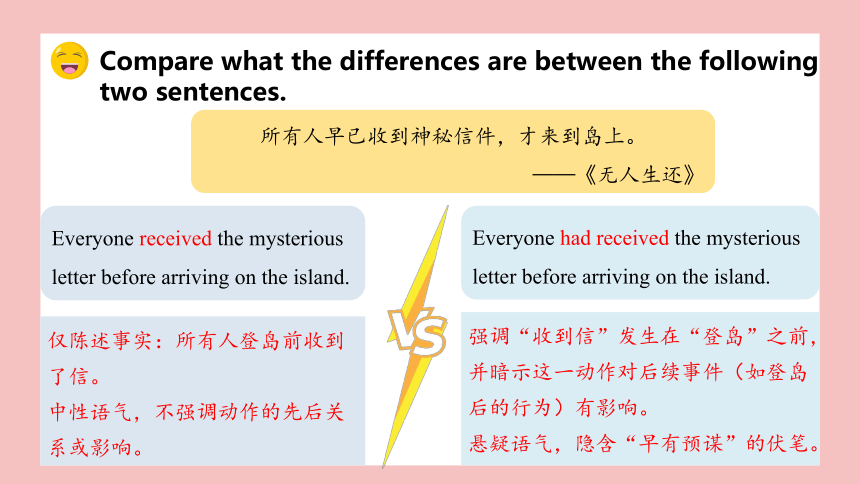
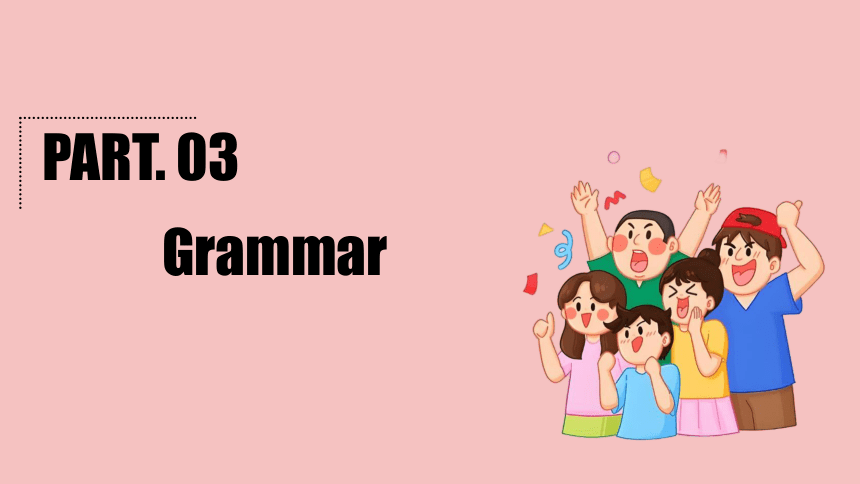
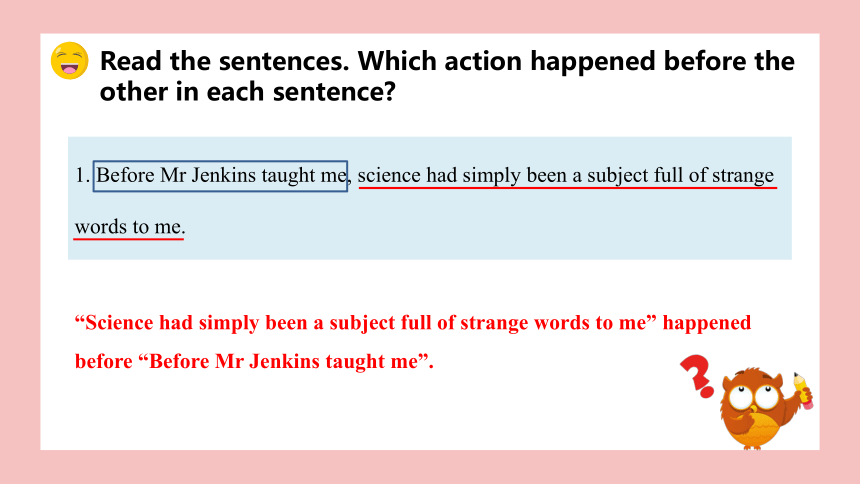
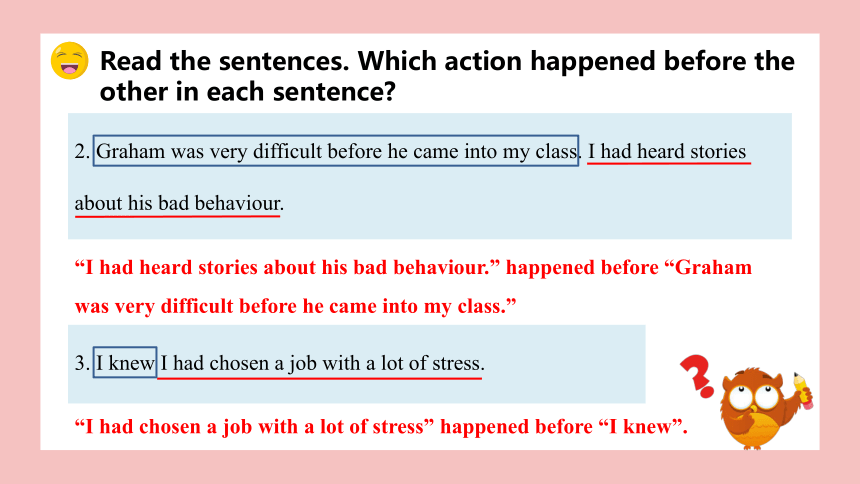
文档简介
(共29张PPT)
Unit 1
Relationships
Lesson 1 (Grammar)
Learning Objectives
PART. 01
Understand the daily study and life of British middle school students by watching videos. Based on your own daily study and life, compare the study and life in Chinese and British schools, and find out the similarities and differences between the two. Talk about your first impression of high school life, and have a preliminary perception of the study and life in the senior high school stage.
Learning Objectives
Discover and master the structure and usage of the past perfect, and apply it flexibly in real-life contexts. Expand vocabulary related to education, personal experiences, and daily events.
The topic of “past events” connects to universal life experiences, helping students recognize shared cultural narratives about personal stories and how past actions shape present outcomes across cultures.
Develop your analytical thinking by exploring the rules of the past perfect, and stimulate critical thinking through tasks. When inventing explanations for situations, students use creativity to apply grammar.
Practice grammar-in-context strategies to master the past perfect tense. Learn to self-check tense usage by analyzing action sequences.
Understand the daily study and life of British middle school students by watching videos. Based on your own daily study and life, compare the study and life in Chinese and British schools, and find out the similarities and differences between the two. Talk about your first impression of high school life, and have a preliminary perception of the study and life in the senior high school stage.
Teaching Focuses and Anticipated Difficulties
Master the structure and usage of the past perfect, and apply it flexibly in real-life contexts with expanded related vocabulary.
Analyzing action sequences to self-check past perfect usage and creatively applying the tense in invented situation explanations.
Lead-in
PART. 02
Compare what the differences are between the following two sentences.
所有人早已收到神秘信件,才来到岛上。
——《无人生还》
Everyone had received the mysterious letter before arriving on the island.
Everyone received the mysterious letter before arriving on the island.
仅陈述事实:所有人登岛前收到了信。
中性语气,不强调动作的先后关系或影响。
强调“收到信”发生在“登岛”之前,并暗示这一动作对后续事件(如登岛后的行为)有影响。
悬疑语气,隐含“早有预谋”的伏笔。
Grammar
PART. 03
Read the sentences. Which action happened before the other in each sentence
1. Before Mr Jenkins taught me, science had simply been a subject full of strange words to me.
“Science had simply been a subject full of strange words to me” happened before “Before Mr Jenkins taught me”.
Read the sentences. Which action happened before the other in each sentence
2. Graham was very difficult before he came into my class. I had heard stories about his bad behaviour.
“I had heard stories about his bad behaviour.” happened before “Graham was very difficult before he came into my class.”
3. I knew I had chosen a job with a lot of stress.
“I had chosen a job with a lot of stress” happened before “I knew”.
Past perfect (过去完成时)
一、过去完成时的概念
过去完成时表示过去某一时间或动作之前发生的动作或状态,以及对过去的某一点造成的某种影响或是结果,强调时间先后关系。
When I arrived at the party, Tom had already left.
我到派对时,汤姆已经走了。
动作顺序:① Tom离开 → ② 我到达
二、过去完成时的构成
过去完成时由“助动词 had (通用于各种人称和数)+过去分词”构成。
三、过去完成时的形式
1. 过去完成时的肯定句:主语+had+过去分词+其他
By the time I got to school, the class had started.
我到学校的时候,课程已经开始了。
2. 过去完成时的否定句:主语+had+not+过去分词+其他
He had not eaten breakfast when he left home.
他离开家的时候,还没吃早饭。
3. 过去完成时的被动语态:主语+had+been+过去分词+其他
The new school building had been built when I became a student here.
我来这里上学时,新教学楼已经建成了。
4. 过去完成时的一般疑问句:Had+主语+过去分词+其他
回答方式:Yes, 主语+had. / No, 主语+had+not.
—Had you finished reading the book before the class
上课前你读完这本书了吗?
—Yes, I had. / No, I had not.
是,读完了 。 / 不,没读完。
四、过去完成时的用法
1. 过去完成时表示在过去某一时间或某一动作之前已经完成的动作或存在的状态。
When she arrived at the cinema, the movie had already started.
她到电影院时,电影已经开始了。
2. 还可表示过去某一时刻之前发生的动作或状态持续到过去某个时间或还要持续下去,常用的时间状语有by then,by the end of 等。
By the end of last term, our class had planted over 100 trees in the schoolyard.
到上学期末,我们班已经在校园种了100多棵树 。
By then, my little sister had saved over 500 yuan from her pocket money.
到那时,我妹妹已从零花钱里存了 500 多元。
3. 用于表示与过去事实相反的虚拟条件从句中。
If she had studied harder last term, she would have passed all the exams.
要是她上学期学习再努力点,就会通过所有考试了。
4. 过去完成时也用于hardly...when..., no sooner…than..., It was the first time+that(从) 等一些固定句型中。
Hardly had he stepped into the house when it started to rain heavily.
他刚踏进家门,就开始下大雨了。
5. 表示未曾实现的希望、打算、意图、诺言、想法等,常用过去完成时。
He had planned to go hiking this weekend, but it rained.
他本打算这周末去徒步,结果下雨了。
五、过去完成时与一般过去时的区别
1. 时间状语不同:过去完成时在时间上强调“过去的过去”,而一般过去时只强调过去某一特定的时间。
By the end of last week, she had finished reading five classic novels.
到上周末为止,她已经读完了五本经典小说。(“读完” 在 “上周末” 这个过去
时间前就完成了)
She finished reading a poem collection last night.
她昨晚读完了一本诗集。(单纯说昨晚发生的动作 )
五、过去完成时与一般过去时的区别
2. 在没有明确的过去时间状语作标志时,谓语动词动作发生的时间先后须依据上下文来判断:先发生的用过去完成时,后发生的则用一般过去时。
He had prepared a big surprise for his mom. He gave it to her when she got home.
他给妈妈准备了一个大惊喜 。妈妈回家时,他把惊喜送出去了 。(“准备惊喜”
先于 “送惊喜 / 妈妈回家” ,所以 “had prepared” 是过去完成时,“gave”“got” 是
一般过去时。)
Read the sentences again. Decide which tense is used to talk about:
an event in the past
an event that happened earlier, before the other past event in the story
simple past tense
past perfect tense
Choose the sentence that best describes each picture.
a. The film began when they arrived at the cinema.
b. The film had begun when they arrived at the cinema.
Choose the sentence that best describes each picture.
a. The police arrested the man who was breaking into a jewellery shop.
b. The police arrested the man who had broken into a jewellery shop.
Provide an explanation for the situations, using the cues and the past perfect tense. Then add another possible explanation.
Example The whole class cheered for John. (John / win an award)
The whole class cheered for John because he had won an award.
The whole class cheered for John because he had run the fastest on Sports Day.
1. My car broke down on the way to the beach. (it / run out of petrol)
My car broke down on the way to the beach because it had run out of petrol.
My car broke down on the way to the beach because it had hit a stone halfway.
Provide an explanation for the situations, using the cues and the past perfect tense. Then add another possible explanation.
2. The dog hid under the sofa. (it / eat the family’s dinner)
My car broke down on the way to the beach because it had run out of petrol.
My car broke down on the way to the beach because it had hit a stone halfway.
3. A car crashed into a tree. (driver / fall asleep)
A car crashed into a tree because the driver had fallen asleep.
A car crashed into a tree because it had broken down.
4. The Smiths went on a round-the-world trip. (Mr Smith / get a pay rise)
The Smiths went on a round–the–world trip because Mr Smith got a pay rise.
The Smiths went on a round–the–world trip because Mr Smith had got a promotion.
Exercise
PART. 04
By the time the firemen ________(arrive), the building __________(burn) for over an hour.
She _______________(not realize) how much work the project required until she ________(start) it.
He __________(apologize) because he ____________(forget) our appointment the day before.
My parents __________(live) in London for a decade when they _______(decide) to move back to their hometown.
Exercise: 用所给词的适当形式填空
arrived
had burned
had not realized
started
apologized
had forgotten
had lived
decided
If he __________ (take) my advice, he wouldn’t have made such a big mistake.
Hardly __________ (have) she entered the classroom when the bell rang.
It was the third time that he ________________ (forget) to bring his textbook.
When I finally found my keys, I realized I ___________ (leave) them in the office.
They __________ (hope) to go on a picnic, but the heavy rain stopped them.
Before she became a famous writer, she ______________ (publish) several short stories.
He looked very tired because he _________________ (work) for 12 hours straight.
Exercise: 用所给词的适当形式填空
had taken
had
had left
had forgotten
had hoped
had published
had been working
Summary
PART. 05
添加标题
ADD THE TITLE HERE
Lesson 1 (Grammar)
过去完成时的构成
过去完成时
过去完成时的形式
过去完成时的用法
过去完成时与一般过去时的区别
过去完成时的概念
Homework
PART. 06
Summarise what we have learnt in this lesson;
Prepare for the next lesson.
Homework
See you next class!
Unit 1
Relationships
Lesson 1 (Grammar)
Learning Objectives
PART. 01
Understand the daily study and life of British middle school students by watching videos. Based on your own daily study and life, compare the study and life in Chinese and British schools, and find out the similarities and differences between the two. Talk about your first impression of high school life, and have a preliminary perception of the study and life in the senior high school stage.
Learning Objectives
Discover and master the structure and usage of the past perfect, and apply it flexibly in real-life contexts. Expand vocabulary related to education, personal experiences, and daily events.
The topic of “past events” connects to universal life experiences, helping students recognize shared cultural narratives about personal stories and how past actions shape present outcomes across cultures.
Develop your analytical thinking by exploring the rules of the past perfect, and stimulate critical thinking through tasks. When inventing explanations for situations, students use creativity to apply grammar.
Practice grammar-in-context strategies to master the past perfect tense. Learn to self-check tense usage by analyzing action sequences.
Understand the daily study and life of British middle school students by watching videos. Based on your own daily study and life, compare the study and life in Chinese and British schools, and find out the similarities and differences between the two. Talk about your first impression of high school life, and have a preliminary perception of the study and life in the senior high school stage.
Teaching Focuses and Anticipated Difficulties
Master the structure and usage of the past perfect, and apply it flexibly in real-life contexts with expanded related vocabulary.
Analyzing action sequences to self-check past perfect usage and creatively applying the tense in invented situation explanations.
Lead-in
PART. 02
Compare what the differences are between the following two sentences.
所有人早已收到神秘信件,才来到岛上。
——《无人生还》
Everyone had received the mysterious letter before arriving on the island.
Everyone received the mysterious letter before arriving on the island.
仅陈述事实:所有人登岛前收到了信。
中性语气,不强调动作的先后关系或影响。
强调“收到信”发生在“登岛”之前,并暗示这一动作对后续事件(如登岛后的行为)有影响。
悬疑语气,隐含“早有预谋”的伏笔。
Grammar
PART. 03
Read the sentences. Which action happened before the other in each sentence
1. Before Mr Jenkins taught me, science had simply been a subject full of strange words to me.
“Science had simply been a subject full of strange words to me” happened before “Before Mr Jenkins taught me”.
Read the sentences. Which action happened before the other in each sentence
2. Graham was very difficult before he came into my class. I had heard stories about his bad behaviour.
“I had heard stories about his bad behaviour.” happened before “Graham was very difficult before he came into my class.”
3. I knew I had chosen a job with a lot of stress.
“I had chosen a job with a lot of stress” happened before “I knew”.
Past perfect (过去完成时)
一、过去完成时的概念
过去完成时表示过去某一时间或动作之前发生的动作或状态,以及对过去的某一点造成的某种影响或是结果,强调时间先后关系。
When I arrived at the party, Tom had already left.
我到派对时,汤姆已经走了。
动作顺序:① Tom离开 → ② 我到达
二、过去完成时的构成
过去完成时由“助动词 had (通用于各种人称和数)+过去分词”构成。
三、过去完成时的形式
1. 过去完成时的肯定句:主语+had+过去分词+其他
By the time I got to school, the class had started.
我到学校的时候,课程已经开始了。
2. 过去完成时的否定句:主语+had+not+过去分词+其他
He had not eaten breakfast when he left home.
他离开家的时候,还没吃早饭。
3. 过去完成时的被动语态:主语+had+been+过去分词+其他
The new school building had been built when I became a student here.
我来这里上学时,新教学楼已经建成了。
4. 过去完成时的一般疑问句:Had+主语+过去分词+其他
回答方式:Yes, 主语+had. / No, 主语+had+not.
—Had you finished reading the book before the class
上课前你读完这本书了吗?
—Yes, I had. / No, I had not.
是,读完了 。 / 不,没读完。
四、过去完成时的用法
1. 过去完成时表示在过去某一时间或某一动作之前已经完成的动作或存在的状态。
When she arrived at the cinema, the movie had already started.
她到电影院时,电影已经开始了。
2. 还可表示过去某一时刻之前发生的动作或状态持续到过去某个时间或还要持续下去,常用的时间状语有by then,by the end of 等。
By the end of last term, our class had planted over 100 trees in the schoolyard.
到上学期末,我们班已经在校园种了100多棵树 。
By then, my little sister had saved over 500 yuan from her pocket money.
到那时,我妹妹已从零花钱里存了 500 多元。
3. 用于表示与过去事实相反的虚拟条件从句中。
If she had studied harder last term, she would have passed all the exams.
要是她上学期学习再努力点,就会通过所有考试了。
4. 过去完成时也用于hardly...when..., no sooner…than..., It was the first time+that(从) 等一些固定句型中。
Hardly had he stepped into the house when it started to rain heavily.
他刚踏进家门,就开始下大雨了。
5. 表示未曾实现的希望、打算、意图、诺言、想法等,常用过去完成时。
He had planned to go hiking this weekend, but it rained.
他本打算这周末去徒步,结果下雨了。
五、过去完成时与一般过去时的区别
1. 时间状语不同:过去完成时在时间上强调“过去的过去”,而一般过去时只强调过去某一特定的时间。
By the end of last week, she had finished reading five classic novels.
到上周末为止,她已经读完了五本经典小说。(“读完” 在 “上周末” 这个过去
时间前就完成了)
She finished reading a poem collection last night.
她昨晚读完了一本诗集。(单纯说昨晚发生的动作 )
五、过去完成时与一般过去时的区别
2. 在没有明确的过去时间状语作标志时,谓语动词动作发生的时间先后须依据上下文来判断:先发生的用过去完成时,后发生的则用一般过去时。
He had prepared a big surprise for his mom. He gave it to her when she got home.
他给妈妈准备了一个大惊喜 。妈妈回家时,他把惊喜送出去了 。(“准备惊喜”
先于 “送惊喜 / 妈妈回家” ,所以 “had prepared” 是过去完成时,“gave”“got” 是
一般过去时。)
Read the sentences again. Decide which tense is used to talk about:
an event in the past
an event that happened earlier, before the other past event in the story
simple past tense
past perfect tense
Choose the sentence that best describes each picture.
a. The film began when they arrived at the cinema.
b. The film had begun when they arrived at the cinema.
Choose the sentence that best describes each picture.
a. The police arrested the man who was breaking into a jewellery shop.
b. The police arrested the man who had broken into a jewellery shop.
Provide an explanation for the situations, using the cues and the past perfect tense. Then add another possible explanation.
Example The whole class cheered for John. (John / win an award)
The whole class cheered for John because he had won an award.
The whole class cheered for John because he had run the fastest on Sports Day.
1. My car broke down on the way to the beach. (it / run out of petrol)
My car broke down on the way to the beach because it had run out of petrol.
My car broke down on the way to the beach because it had hit a stone halfway.
Provide an explanation for the situations, using the cues and the past perfect tense. Then add another possible explanation.
2. The dog hid under the sofa. (it / eat the family’s dinner)
My car broke down on the way to the beach because it had run out of petrol.
My car broke down on the way to the beach because it had hit a stone halfway.
3. A car crashed into a tree. (driver / fall asleep)
A car crashed into a tree because the driver had fallen asleep.
A car crashed into a tree because it had broken down.
4. The Smiths went on a round-the-world trip. (Mr Smith / get a pay rise)
The Smiths went on a round–the–world trip because Mr Smith got a pay rise.
The Smiths went on a round–the–world trip because Mr Smith had got a promotion.
Exercise
PART. 04
By the time the firemen ________(arrive), the building __________(burn) for over an hour.
She _______________(not realize) how much work the project required until she ________(start) it.
He __________(apologize) because he ____________(forget) our appointment the day before.
My parents __________(live) in London for a decade when they _______(decide) to move back to their hometown.
Exercise: 用所给词的适当形式填空
arrived
had burned
had not realized
started
apologized
had forgotten
had lived
decided
If he __________ (take) my advice, he wouldn’t have made such a big mistake.
Hardly __________ (have) she entered the classroom when the bell rang.
It was the third time that he ________________ (forget) to bring his textbook.
When I finally found my keys, I realized I ___________ (leave) them in the office.
They __________ (hope) to go on a picnic, but the heavy rain stopped them.
Before she became a famous writer, she ______________ (publish) several short stories.
He looked very tired because he _________________ (work) for 12 hours straight.
Exercise: 用所给词的适当形式填空
had taken
had
had left
had forgotten
had hoped
had published
had been working
Summary
PART. 05
添加标题
ADD THE TITLE HERE
Lesson 1 (Grammar)
过去完成时的构成
过去完成时
过去完成时的形式
过去完成时的用法
过去完成时与一般过去时的区别
过去完成时的概念
Homework
PART. 06
Summarise what we have learnt in this lesson;
Prepare for the next lesson.
Homework
See you next class!
同课章节目录
- Unit 1 Relationshis
- Lesson 1 Teachers
- Lesson 2 How Do We Like Teachers’ Feedback?
- Lesson 3 So Close,Yet So Fa
- Unit 2 Success
- Lesson 1 Money vs Success
- Lesson 2 Top Five Secrets of Success
- Lesson 3 Getting to the Top
- Unit 3 Conservation
- Lesson 1 The Sixth Extinction
- Lesson 2 War on Plastic Packets
- Lesson 3 The Road to Destruction
